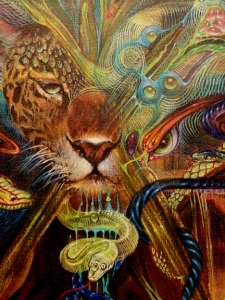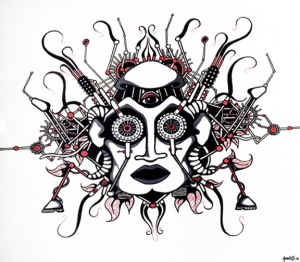Sixteen of us met with Betsy and her co-trainer, Mysnikol, for a six-week class: Faith and Hope In a Time of Uncertainty. We spent much of our time in pairs and small groups, addressing questions about what we feared and where we found hope. Two foundational assumptions of the workshop were:
- The best, truest, answers to such questions are the ones we find within ourselves, that rise out of our own lived experience.
- Just as you may deal with a stone in your shoe by walking on another part of your foot, so people tend to avoid things they fear. This is a natural short-term strategy but if it becomes habitual it also restricts the full range of the soul’s movement and growth.
Over her lifetime, Joanna Macy has written many books and led many workshops on different subjects that take us through the same emotional arc. If you are in a problematic situation where you are afraid, you must go toward, go into, your fear. If you want to be as balanced and effective as possible in difficult circumstances, you must stop and reach for the stone that breaks your stride. Once you have given that painful thing the attention it deserves, then you are freed to express your full self in new ways, or in ways you had forgotten you have access to.
I believe everyone in the Hope & Faith class was able to do this, to some degree. The first two or three classes were tough for some. A fear which you have not yet befriended looms large with uncertainty. As we went into our fears, the ones particular to us, and the ones we shared, they lost some of their power. It was frightening. And the fears did not go away altogether. But as Joanna Macy and others have found, working with perhaps a million people,
- Approaching the fear, the topic or subject we fear
- Meeting it, getting to know it better, becoming familiar with it,
- Frees valuable energy, lengthens our stride, helps us to carry our burdens.
Going toward the fear requires a certain readiness, enough available personal resources to start the work. It requires resolve, courage. And, almost universally, the result of a concentrated effort to do this work provides a sense of release, of relief and greater energy going forward.
This is my faith, as I turn to my work, which is also our work.
What I hear Paul Gilding say, which comes also from my thinking over the years, is that the “status quo” ended a while back, but Industrial Civilization has been semi-willfully ignoring it. I had been kind of expecting the turning point would be a spectacular environmental disaster that threatened health and lives where the wealthy nations are, like a sea level rise, or a nuclear spill.
Gilding says the world economy is the most delicate, sensitive part that Industrial Civilization has. The underlying conditions of resource depletion and the resulting increase in costs of farming, mining, etc. have been around and evident for years. These underlying conditions show up in our markets as prices, and in the availability and flexibility of money to meet the routine situations we have gotten ourselves into. Many of us know from direct experience how high credit card debt affects our flexibility and resilience. Industrial Civ. had maxed out or over-leveraged credit card after credit card, natural resource after natural resource, borrowing on each new one to make the payments on the old debt.
Don’t just say the words, Richard, feel the fear.
Wait.
Let it sink in.
That fellow, Paul Gilding, has gotten to the point where he can say, “What’s next?”
He assumes the crash of over-leveraged resources in the 2008 housing market was just an early tremor, not “the big one.”
But let me pause.
Let us pause.
Let us pause and accept the weight of our fear.
The U.S. economy is “growing” again, squeezing more out of the earth’s finite resources, like fracking oil and gas.
This cannot, will not, go on. Global climate change is more powerful than markets.
“Growing” is not a long-term correction.
And speaking of corrections, the European Market zone is not growing. The Italian market is “too big to fail,” and it is moving down the same road as Iceland, Ireland, Greece and Spain, which were not nearly as big.
Fear.
Is this how it will come? Sort of like the 2008 housing bubble bursting, only much worse?
Fear.
Art: Moksha Family Arts Collective




Great article! Happy to see you writing and look forward to more.
Much Munay, musa